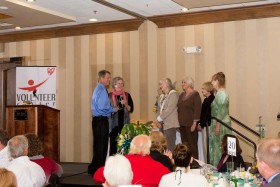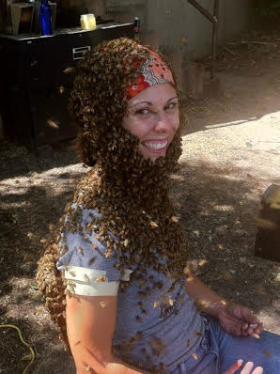On Tuesday, April 26, at 6:30 The Door County Beekeepers Club will offer the program New Things Every Beekeeper Should Know, “ featuring Dr. Becky Masterman, Associate Program Director University of Minnesota Bee Squad. She will share bee management tips based on the latest research from the UMN and other bee labs. Following refreshments she will present a short talk on the Varroa destructor mite. Becky will explain why these parasites are considered by many to be the number one threat to honey bees and how we can work together to address the issue. Public is welcome. Free will donations accepted.
According to Xerces Society Executive Director Scott Black, “Pollinators today live in such a topsy-turvy world it can be hard to pin their troubles on a single cause” but the most significant threats for wild native bees and domestic honey bees seem to be disease, pesticides, habitat loss, and climate change.
An article in the April-May 2016 National Wildlife Magazine, Laura Tangley wrote; “Scientists are increasingly worried about pesticides. One particular concern is a new class of insecticides, the neonicotinoids, that are long lasting and absorbed by plant’s vascular systems—meaning bees are exposed when they eat nectar and pollen. “
We at Crossroads are thinking about bees as we select the plantings which will border the proposed forebay and wildlife scape which will be created as a part of our parking lot expansion. Yes, our main concern is healthy water and that indeed is why we are planting plants known to thrive is moist habitats.
Wetland plants are amazingly good at preventing erosion., Their extensive root systems also will filter the water leaving the parking lot, reducing the contaminants the enter the ponds and water table. Fortunately, the very plant species recommended for detention basins and bio-swales are at the top of the list of plants recommended for pollinating insects.
Bees need nectar and pollen throughout the growing season and by planting variety of moisture tolerating plants, we will provide a reliable food source from early spring until late fall.
Understand that bees do not see the same colors we do. They are attracted to flowers that are yellow, purple and ultraviolet [a color we see as white.] Native flower are almost all yellow, purple or white.
Because they cannot hover, bees prefer a blossom with a flat surface–a “landing pad”. This is another compelling reason to plant native plants. Cultivars and hybrids have been bred for showy flowers, but often have been altered just enough the bees fail to recognize the scent, shape or color. Double blooms, while admittedly stunning, are not bee-friendly because their many petals make it difficult to access nectar.
According to Tangley’s article, “The buzz about bees in not all bad. In recent years, public interest in and concern about the insects has increased, fueled in part by well-publicized losses of honey bees to CCD. “Colony collapse disorder turned out to have a bit of a silver lining,” Scott Black says., “Now more people know that the food they eat depends on pollinators.’
The best bee news of all, though, may be that anyone with just a tiny piece of land can help these critical pollinators. ‘Bees are not bison,” says Sam Droege [who heads the U.S. Geological Survey’s Bee Inventory and Monitoring Lab] “Anywhere you have a good, pesticide-free habitat, even as small as a suburban backyard, you are likely to find a good diversity and abundance of bees.”
When we expand our parking lot, we will endeavor to improve our habitat for bees, and consequently, probably improve the yield in our Heritage Garden.
Crossroads at Big Creek is a community-supported preserve welcoming learners of all ages to programs in science, history and the environment. The Collins Learning Center, located at 2041 Michigan, is open 2:00-4:30 daily and during scheduled events. During the construction, to reach the center, take the highway detour to County T (Alabama Street) cross the highway to Big Creek Road and turn right. Proceed to Lily Bay Road and turn right. Lily Bay Road will merge with Michigan and the Crossroads entrance will be on your left.
Sunday, April 24, 5:00Wild Ones Program:”Neonics”
Wild Ones President Peter Sigmann, who is a physician, will discuss the pharmacology, toxicology and ecologic effects of these pesticides and entomologist Dick Smythe will respond to or clarify questions concerning insects in general. The program is free and open to the public and a special invitation is extended to gardeners and beekeepers.Lecture Hall of the Collins Learning Center.
Tuesday, April 26, 6:30 Lecture: New Things Every Beekeeper Should Know”
=Guest speaker Dr. Becky Masterman, Associate Program Director University of Minnesota Bee Squad will share bee management tips based on the latest research from the University of Minnesota and other bee labs. Following refreshments she will present a short talk on the Varroa destructor mite. Becky will explain why these parasites are considered by many to be the number one threat to honey bees and how we can work together to address the issue. Public is welcome. Free will donations accepted. Lecture hall of the Collins Learning Center.



